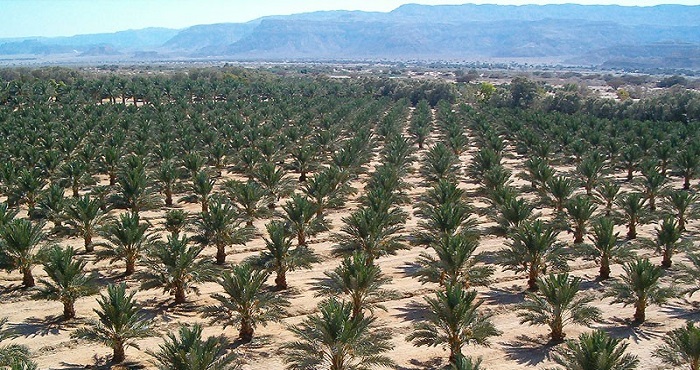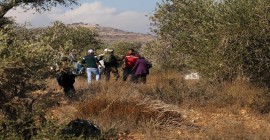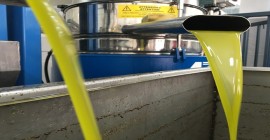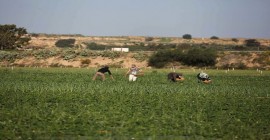Water Shortage Threatens Date Palm Sector in Palestine

Officials estimate that the Jordan Valley, which is famous for its date palms, produced around 6000 tons of dates during this harvest season, in comparison with 600 tons produced in 2010, as the area planted by large companies and small farmers has doubled in size.
Ahmad Fares, head of the Agriculture Department in Jericho, said that there are currently 220,000 palm trees in the Governorate of Jericho, in comparison with 20,000 trees in 2010, according to latest statistics.
“During the past few years, large companies have invested in this sector, which has proven to be economically feasible,” Fares told Reuters.
He added: “Palestine exports dates to more than 20 Arab and foreign countries.”
Palestinian investment in this sector reaches up to $200 million, covering the costs of cultivation, packaging, and export activities. Jericho’s climate is suitable for producing several kinds of dates, including the internationally known “Medjool dates,” which form 95% of Jericho’s production of dates.
Estimates indicate that 5000 people work in this sector, whose exports represent 50% of the Palestinian agriculture sector’s exports.
However, Fares explains that “this sector is facing a real problem resulting from the shortage of water needed for existing projects or for future expansions, as large areas of land are available for cultivation.”
“In the next five years,” he continued, “we will have around half a million to one million shoots (the part of a palm tree that can be planted), and if we are able to secure the needed water, we will be able to double the area cultivated with palm trees. If not, we will incur losses.”
“The Ministry of Agriculture is setting an alternative plan to export these shoots abroad, even if its priority is to expand the area of the land cultivated with palm trees.”
Ismail Deiq, one of the largest investors in this sector, thinks that palm tree cultivation is facing a real threat.
“If the decline in available water continues over the upcoming four or five weeks, we do not expect to be able to produce any more dates. Date production in Palestine is equal to that of stone and marble,” he told Reuters.
However, Deiq anticipates that if a solution is found to the water shortage, the revenue generated by this sector will increase to around $120 – 150 million within the next six or seven years, in comparison with a current revenue of $35 million.
Water experts have provided a number of solutions that contribute to increasing the amount of water available for the date palm sector in Jericho.
Abdel Rahman Tamimi, general manager of the Palestinian Hydrology Group, told Reuters that “the solution does not lie in digging up wells, but in organizing the pumping of water from wells, the efficient management of water resources, making use of rainwater through dams, the reuse of wastewater, and the rehabilitation of Al-Auja water dam.”
“A recently conducted study revealed that we can make use of around 6 – 7 million square meters of water, resulting from water collection and mixing salt water with treated water to produce water suitable for irrigating palm trees. However, this requires a comprehensive vision,” he added.
Tamimi also believes that “the depletion and excess salinization of groundwater in Jericho were caused by Israeli wells that are equipped with modern water pumps.”
Tamimi explained that water experts are considering transferring water from the north of the Jordan Valley to its south, as water is more abundant in the north. We could also make use of water springs, such as Far’a and Ein Al-Sultan in the south.
He also thinks that Palestinians should urge donor countries to invest in infrastructure projects in Palestine, and not in partial solutions that “neither nourish nor avail against hunger.”
Water shortage is not the only problem facing the date palm sector. Tens of Israeli settlements constructed on Palestinian land compete against the Palestinians in palm tree cultivation.
Standing among palm trees, Nasser Qattam, a farmer in Jericho, told Reuters that “another problem we face is that settlement produced goods have entered into the Palestinian market and are competing against Palestinian products. Not only that, but they also carry the name of a Palestinian product.”
(Reuters)





